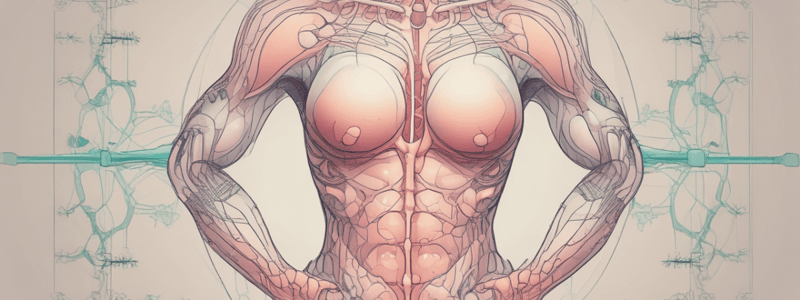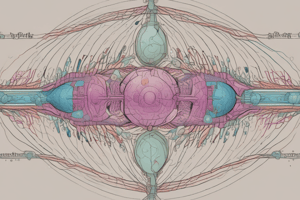Podcast
Questions and Answers
What is the primary function of progesterone in breast development?
What is the primary function of progesterone in breast development?
- Developing the lobule-alveolar system (correct)
- Regulating parathyroid hormone
- Inhibiting milk secretion
- Promoting lactation
During pregnancy, what is the role of estrogen and progesterone?
During pregnancy, what is the role of estrogen and progesterone?
- Developing the lobule-alveolar system
- Regulating cortisol levels
- Promoting lactation
- Inhibiting milk secretion (correct)
What hormone promotes lactation?
What hormone promotes lactation?
- Progesterone
- Prolactin (correct)
- Growth hormone
- Estrogen
What happens to estrogen and progesterone levels after birth?
What happens to estrogen and progesterone levels after birth?
What is the function of growth hormone in milk formation?
What is the function of growth hormone in milk formation?
What stimulates a surge in prolactin secretion during lactation?
What stimulates a surge in prolactin secretion during lactation?
What happens to prolactin levels after the baby is born?
What happens to prolactin levels after the baby is born?
What is the role of cortisol in milk formation?
What is the role of cortisol in milk formation?
What is the association between prenatal depression in women and placental lactogen levels?
What is the association between prenatal depression in women and placental lactogen levels?
What is the effect of maternal obesity on placental lactogen production?
What is the effect of maternal obesity on placental lactogen production?
Where is prolactin synthesized and released into the cerebrospinal fluid?
Where is prolactin synthesized and released into the cerebrospinal fluid?
What is the result of prolactin binding to its receptors?
What is the result of prolactin binding to its receptors?
What is the effect of lactogenic hormones during pregnancy and lactation?
What is the effect of lactogenic hormones during pregnancy and lactation?
What is the reason for the suppression of ovarian cycles after delivery in nursing mothers?
What is the reason for the suppression of ovarian cycles after delivery in nursing mothers?
What happens to gonadotropin-releasing hormone (GnRH) secretion when breastfeeding is reduced?
What happens to gonadotropin-releasing hormone (GnRH) secretion when breastfeeding is reduced?
What is the effect of lactation on the ovarian cycle?
What is the effect of lactation on the ovarian cycle?
What is the primary function of prolactin in lactation?
What is the primary function of prolactin in lactation?
What is the name of the hormone produced by the hypothalamus that inhibits prolactin production?
What is the name of the hormone produced by the hypothalamus that inhibits prolactin production?
During pregnancy, which hormone is produced by the syncytiotrophoblast cells in the human placenta?
During pregnancy, which hormone is produced by the syncytiotrophoblast cells in the human placenta?
What is the effect of dopamine on prolactin secretion?
What is the effect of dopamine on prolactin secretion?
At what stage of gestation is human placental lactogen detectable?
At what stage of gestation is human placental lactogen detectable?
What is the primary function of human placental lactogen during pregnancy?
What is the primary function of human placental lactogen during pregnancy?
Which hormone is similar to growth hormone in structure and function?
Which hormone is similar to growth hormone in structure and function?
What is the role of lactogenic hormones in maternal behavior?
What is the role of lactogenic hormones in maternal behavior?
What is the primary source of estrogen stimulation of breast development during pregnancy?
What is the primary source of estrogen stimulation of breast development during pregnancy?
What type of breast tissue is resistant to carcinogens?
What type of breast tissue is resistant to carcinogens?
What is the effect of breastfeeding on estrogen exposure?
What is the effect of breastfeeding on estrogen exposure?
What is necessary for milk secretion from the breast?
What is necessary for milk secretion from the breast?
What is the effect of breastfeeding on menstrual cycles?
What is the effect of breastfeeding on menstrual cycles?
Flashcards are hidden until you start studying
Study Notes
Breast Development
- Progesterone, estrogen, growth hormone, prolactin, adrenal glucocorticoids, and insulin develop the mature breast lobules, with budding of alveoli and progress of secretory characteristics in the cells of the alveoli.
- Progesterone is required for full development of the lobule-alveolar system.
Hormonal Regulation of Lactation
- Prolactin promotes lactation, inducing milk secretion and causing the breasts to secrete milk.
- Estrogen and progesterone during pregnancy inhibit milk secretion, allowing only a few milliliters of fluid to be secreted until after the baby is born.
- After birth, estrogen and progesterone levels drop, and prolactin induces milk secretion in 1-7 days.
- Prolactin concentration in the mother's blood rises steadily from the 5th week of pregnancy until birth, then returns to non-pregnant levels over the next few weeks.
Prolactin Regulation
- Prolactin secretion is controlled by an inhibitory factor, prolactin inhibitory hormone (dopamine), produced in the hypothalamus.
- Dopamine decreases prolactin secretion 10-fold.
- Nervous signals from the nipples to the hypothalamus during breast feeding cause a 10-20-fold surge in prolactin secretion that lasts for about 1 hour.
Other Lactotropes
- Chorionic somatomammotropin is a placental hormone with lactogenic properties, belonging to the growth hormone/prolactin gene family.
- Human placental lactogen is a placental hormone with key metabolic functions in pregnancy, mobilizing free fatty acids from lipids.
Effects of Lactogens on Mother's Mood
- Maternal behavior is influenced by lactogenic hormones, which may regulate postpartum mood in women.
- Low placental lactogen levels are associated with prenatal depression and postpartum depression.
- Maternal obesity is a risk factor for low placental lactogen production and postpartum depression and anxiety.
Suppression of Ovarian Cycles after Delivery
- Ovarian cycle (and ovulation) is blocked until a few weeks after cessation of nursing due to nervous signals from the breasts to the hypothalamus that inhibit secretion of gonadotropin-releasing hormone (GnRH).
- GnRH stimulates the formation of gonadotropic hormones, and its absence blocks ovarian cycle during several months of lactation.
Breast Development
- Estrogens stimulate the development of the mammary glands and the deposition of fat during puberty, known as thelarche.
- Polymastia is a common developmental abnormality of the breast, consisting of more than 2 mammary glands.
- Supernumerary breast tissue usually develops along the mammary line.
Hormonal Regulation of Breast Development
- Progesterone is required for full development of the lobule-alveolar system.
- Estrogen, progesterone, growth hormone, prolactin, adrenal glucocorticoids, and insulin develop the mature breast lobules.
- Estrogen stimulates growth of the ductal system of the breast, causing it to grow and branch, and increasing the stroma of the breasts.
Lactation
- Prolactin promotes lactation and is secreted by the mother's anterior pituitary gland.
- Prolactin concentration in the mother's blood rises steadily from the fifth week of pregnancy until birth.
- Once the baby is born, estrogen and progesterone levels decrease, and prolactin induces milk secretion.
- Other hormones necessary for milk formation include growth hormone, cortisol, parathyroid hormone, and insulin.
Effects of Lactogens on Mother's Mood
- Prolactin can be synthesized and released into the cerebrospinal fluid by epithelial cells in the choroid plexus.
- Prolactin binding to its receptors results in dimerization and activation of JAK2, triggering a signaling cascade.
- Latogenic hormones production during pregnancy and lactation regulates functions in the mother and the newborn, including pup retrieval, licking, and nurturing.
Suppression of Ovarian Cycles after Delivery
- In most nursing mothers, the ovarian cycle is blocked until a few weeks after cessation of nursing.
- Nervous signals from the breasts to the hypothalamus during suckling inhibit secretion of gonadotropin-releasing hormone (GnRH).
- GnRH stimulates the formation of the gonadotropic hormones, and its absence blocks ovarian cycle during several months of lactation.
Lobules' Evolution during Life
- Both type 3 and type 4 lobules are resistant to carcinogens.
- If a woman does not have pregnancy, she has an increased risk for breast cancer.
- Breastfeeding reduces estrogen exposure, misses menstrual cycles, and promotes breast tissue maturity to type 4 lobules.
Studying That Suits You
Use AI to generate personalized quizzes and flashcards to suit your learning preferences.




